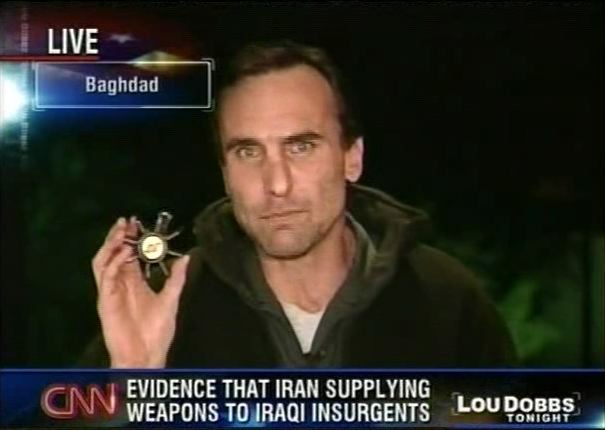LDT: Iranian weapons in Baghdad

Click photo to play
Length: 4:40
LOU DOBBS: Iran is also challenging U.S. policy in Iraq. Iran's supreme leader, Ayatollah Khamenei, today met with the Iraqi president in Tehran. Ayatollah Khamenei asserted that the United States is the main cause of the escalating violence in Iraq.
Michael Ware joins us now from Baghdad.
Michael, how large a role is Iran playing in Iraq, to the degree we can determine that? And to what accent is Iran driving the insurgency?
MICHAEL WARE, CNN CORRESPONDENT: Well, certainly the insurgency has many different faces, Lou. And what we're talking about here is the Shia insurgency. Essentially, the Shia militias and paramilitary forces, an alignment of which essentially make up the government.
Now, according to U.S. and British military intelligence, most of these groups, political factions and military factions, receive financial aid, military aid, weapons training, and liaison from Iran, particularly from Iran's Iranian Revolutionary Guard Quds Force, or it's equivalent to the Green Berets.
Now, we've heard about them supplying the key components for the most devastating roadside bombs here in Iraq. I've spoken to British troops in the south who say their bases have been mortared by bombs that carry Iranian markings.
We have the chief of U.S. military intelligence talking about C-4 explosives that can be traced back to Iranian batches. And now we have what U.S. intelligence says is Iranian backing of Shia death squads.
Here, for example, Lou, is the tail fin of an 81-millimeter mortar round. This landed just days ago in a Sunni neighborhood here in Baghdad. It was fired from a Shia area.
What's most interesting about this is that we don't know exactly where it came from, but what we can tell you is that it's date-stamped this year, 2006. It clearly, from its condition, has not been buried in the desert.
So at some point this has crossed Iraq's border. They're not making them here. So it's crossed the border and come into the hands of a Shia militia -- Lou.
DOBBS: Let me ask you, Michael, among the field commanders there with whom you've talked, how much frustration is there that the United States has not been able to, first, successfully interdict those kinds of shipments of materiel in support of the insurgency, as well as the personnel who are also being used, according to many reports; and to what degree is the fact that the militias remain armed -- is that within the control of the forces should the Iraqi government and the United States decide to disarm the militias?
WARE: Well, the United States and the Iraqi government -- for what it is, and beyond the prime minister's office and the office of the national security adviser, one wonders what there is of this government, because beyond that, it's essentially this alliance of militias, as we said, intelligence claiming that many of them are backed by Iran anyway. The U.S. and Prime Minister Nouri al-Maliki, as has been said many times in the past, have not only called upon the militias to disband and disarm, but are now insisting upon it. Yet, we've seen no movement.
DOBBS: Right.
WARE: There is no incentive, Lou, for the militias to disarm and there's nothing to force them. Not even 140,000-plus American troops.
DOBBS: And the frustration among the field commanders, has there been any expressed by those field commanders about the inability to control either the borders or to interdict those supplies?
WARE: Absolutely. I mean, Iraq's borders on both the eastern and western fronts remain porous. Fighters and materiel keep pouring in from the west to support al Qaeda and the Sunni insurgents. The exact same can be said of the eastern border with Iran.
I've spent a lot of time on both borders. With the troop numbers here in the country now, it's simply impossible to seal these borders off.
I've had British intelligence officers tell me that when it comes to combating Iran, it's as though we are sleepwalking, one of them said. And essentially, the Sunnis claim that the Brits maintain an appearance of stability in the south by trading off, accommodating with these Iranian-backed militias so that attacks are few, yet the influence of Iran and its surrogates is great.
DOBBS: Michael, thank you very much. Very revealing, as always. Thank you.
Michael Ware from Baghdad.
